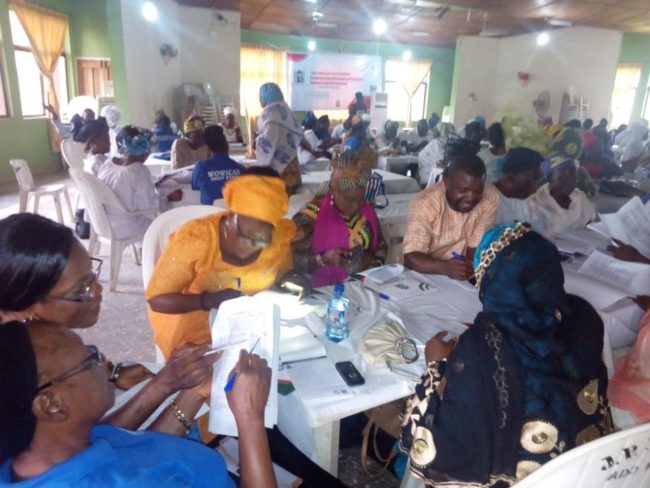Ekiti, Osun Communities decry hijack of LGs’ functions, demand greater engagement with public officials
Ekiti, Osun Communities decry hijack of LGs’ functions, demand greater engagement with public officials
Wednesday, November 1, 2017 4:28 pm
Community leaders in Ekiti and Osun states have decried the near hijack of the statutory functions of local governments by the states. This they say is seriously hampering concrete development efforts at the local level. They also want public officials to regularly interface with them on projects and matters of public policy.
This practice, they argue, will ensure that only projects that uplifts the rural communities are embarked upon. This will also check mismanagement of funds, the funnelling of public funds for private purposes, impunity by LG officials and promote accountability.
At a four-day training and capacity building programme for grassroots community leaders on participatory governance and civic engagement recently organised in Ado Ekiti, by Community Life Project (CLP) with support from the Open Society Initiative of West Africa (OSIWA), they contend that this will foist harmony and trust on development issues at the local level.
“Local Governments are the closest to the people, but we have virtually rendered them spineless financially. They’ve been pocketed by the state governors who can’t even allow them to supervise the collection of TV and radio licences”, notes Pade Aderibigbe, 81, community leader, Ayedire LGA Osun state. Aderibigbe, who is a retired professor of Forensic Accounting says the LGs need to be financially independent to meet the yearnings of the people at the grassroots.
Segun Olusola, director, community development, Ekiti state says, “It is important that the voices of the people in the communities are heard each time government wants to carry out any projects”. “We cannot continue to treat the people as if they do not matter”, he quips.
“Anyone resisting the participation in governance by the people is deluding himself. Participatory governance is the right of the people. Government must be consensus oriented. When government and citizens come together to seek for solution over knotty issues, things are done better”, says Francis Onahor, one of the facilitators. “We can’t afford to do siddon look on matters that concerns us”, he says, charging the participants to always ask questions.
But Akole Olatunbosun Busuyi, 40, a youth leader from Ikere-Ekiti says the public officials have the habit of always isolating them as “saboteurs” each time they tried to engage them on matters of development. “They’ll single you out for a backlash thereafter”, says Busuyi, also a Phd student in Information Science at the University of Ibadan.
This view is corroborated by Adeleke Jacob Ajayi, chairman, community development association, Ilasa-Ekiti who says “If we try to ask questions about what they do, they’ll threaten you and you can even get killed if you are not careful”. “How can we ensure that we’ll be safe when we ask questions? When we ask questions, they’ll threaten us”, says Olaniyan Ishaq Babatunde, community development association youth leader in Atakumosa West Central, Ifewara, Osun state
However, Lanre Arinola, programme officer, community level partnership CLP says the “community leaders must be tactful in their strategy of engagement”. To be effective and avoid being used as sacrificial lambs by angry officials who may not like the faces of those raging against them, “it is important that the community leaders do not act alone. You must ensure you strike some synergy with other groups so that you do not expose yourselves to danger”, says Arinola.
Osun state Chairperson, Federation of Muslim Women Association of Nigeria (FOMWAN), Suaibat Bolanle Babalola Adubi says they are sometimes in a fix when government claim to have engaged the union leaders on the issue of halve salary for instance but the union leaders fail to engage the grassroots people. “Who really do you blame when the government claim they consulted with the representatives of the workers but the union leaders fail to dialogue with their members”, she queries.
The training programme, which involves leaders of community development associations, youth groups, women organisations and faith based associations across 31 LGAs in Ekiti and Osun states, covered areas like community participation, good governance, civic obligations and budget preparation.
It also includes understanding the sources of government revenue and the functions of the local governments. They were also given tips on laws that promote participatory budget process like the Fiscal Responsibility Act of 2007, the Public Procurement Act of 2007 and the Freedom of Information Act of 2011.
On the essence of the programme, Modupeola Kolade, representative of the women wing of Christian Association of Nigeria (CAN), Osun state chapter says, “It’s important we take the message and discuss with our people back home. It is not a fight with public officials but we are going to meaningfully mobilise our people to engage them”, she says.
While thanking the organisers for the training programme, Olagunju Dauda Aderemi, community leader, Osogbo LGA, Osun state wants it extended to the Legislature and the Judiciary. Beyond being a talkshop, Boniface Segun Adeyemi, youth leader, Boluwaduro LGA, Osun state wants a blueprint to ensure the participants are involved in governance. “Do we have a plan to ensure that participants are actively involved in governance beyond talking and talking”, he asks rhetorically.
Executive Director, CLP, Ngozi Iwerre says the programme is designed primarily to raise awareness and empower the people at the local level. “At least it will make the next set of leaders to sit up because they’ll be confronted with a more enlightened citizenry who can confront them with critical questions”, she says.



 2 hours ago
2 hours ago  2 hours ago
2 hours ago  2 hours ago
2 hours ago  3 hours ago
3 hours ago  14 hours ago
14 hours ago  14 hours ago
14 hours ago  15 hours ago
15 hours ago  16 hours ago
16 hours ago
Join The Conversation